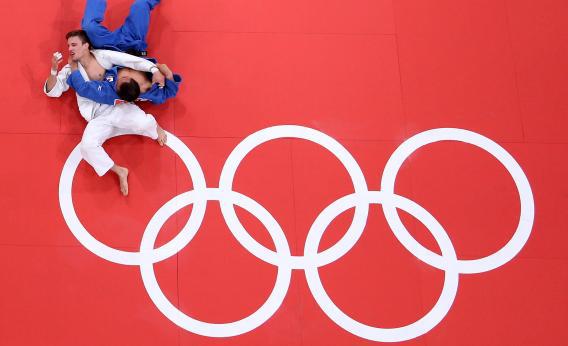On Sunday, a South Korean judoka named Cho Jun-Ho was named the winner of an Olympic quarterfinal match against Japan’s Masashi Ebinuma. His triumph was short-lived: For some reason, officials from the International Judo Federation stepped in and convinced the judges to reverse their decision and hand the match to Ebinuma. While nobody seems to be sure exactly what happened, the contretemps brought to mind one of my favorite summer pastimes: wondering which Olympic sport would be the easiest to rig. Judo seems like a great pick.
Though NBC and the other Olympic mythmakers might not want to admit it, people have been trying to fix the Olympics for as long as the Olympics have existed. Ben Johnson-style doping is only the beginning. In 1976, Soviet pentathlete Boris Onishchenko was expelled from the games when he was found to have modified his épée such that it would register a point whenever he hit a switch hidden in the grip. (For this, he earned the nickname “Disonishchenko.”) At the 2004 Summer Olympics, a Chinese badminton player threw a match so that her teammate, deemed more likely to win gold, would be able to advance. In Seoul in 1988, American boxer Roy Jones Jr. dominated his South Korean opponent but still lost the gold medal match; nine years later, an IOC investigation found that South Korean officials had “wined and dined” the judges. (The IOC refused to acknowledge the judging was corrupt, however.)
These cases demonstrate that there are three basic points of entry for Olympics skullduggery: the equipment, the athletes, and the officials. Tampering with the officials seems the easiest. Sports officials aren’t particularly well paid. They’re often scorned and ridiculed by athletes and the public. Plus, having to wear a silly uniform to work every day can breed a powerful resentment in a man.
By my count, there are more than a dozen Olympic events where a judge or referee might affect the outcome. Emailer Nick, a judo enthusiast, suggests that judo might be the easiest of these to fix.
Judo matches are overseen by three officials, two of whom sit in chairs at opposite corners of the mat. The third official, the referee, is by far the most important. He stands near the competitors, assigns penalties, and has the ability to pause a match.
Writes Nick:
What this means is that there is one official with far more authority than the two line judges. They can disagree, but it takes both to do so. Even then, the vote of the referee has influence. Therefore, you can greatly influence the match with only one conspirator, rather than taking a risk and approaching all three (though in this case, your preferred player would have an extreme advantage).
How is scoring determined in a judo match? It’s not always clear when a judoka has scored or committed a violation, and the awarding of points and penalties is very much a matter of the judges’ discretion. Much like in a basketball game in which the officials decide to “let the players play,” a judo ref might choose to ignore certain illegal grips. If that referee were on the take, he might choose to call those violations, and few people would be the wiser. (Although they might wonder why one judoka keeps getting called for double dribbles.)
As previously mentioned, the referee can pause a match, too—a helpful tactic if you’re trying to disrupt a judoka’s momentum. Also, the International Judo Federation rulebook instructs that the referee “should ensure that all is in good order e.g. competition area, equipment, uniforms, hygiene, technical officials etc. before starting the contest.” This obviously means that, at any moment, a referee could oust a competitor for being too smelly. The opportunities for chicanery are endless!
Though the IJF officials stepped in and reversed the judges’ decision in the Cho-Ebinuma match this Sunday, that sort of thing very rarely happens. Whereas in other sports it’s acceptable to complain to and about the officials, judo is governed by a strong sense of honor and respect. As such, the officials are almost never publicly challenged—by the competitors, at least. Unfortunately, this whole “honor” thing might also make it difficult to find a referee willing to go along with your little scheme. As emailer Nick puts it, judo officals are “committed to the art and have been usually their whole lives. It’s considered an honorable position (much more so than your average soccer judge for example) and they are uncommonly committed to their craft.”
Thanks for the input, Nick. (We’ll see how committed they are when I knock on their doors with a fistful of twenties.) What other sports might be easy to fix? Email me or leave your thoughts in the comments.
